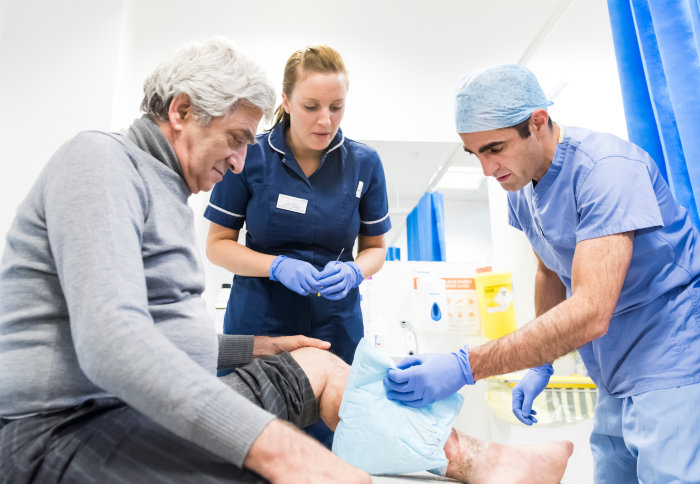Imperial College welcomes world-leading health, research and education designation


@ImperialCollege Academic Health Science Centre has been redesignated an AHSC for a further five years.
The prestigious designation from the National Institute of Health Research and NHS England/Improvement recognises Imperial College AHSC as a centre of excellence in health research, education and patient care.
The Imperial College AHSC is a University-NHS partnership that aims to accelerate the translation of scientific breakthroughs into improvements in human health. Its members are Imperial College London, Imperial College Healthcare NHS Trust, The Royal Marsden NHS Foundation Trust, Royal Brompton & Harefield NHS Foundation Trust and The Institute of Cancer Research (ICR). For the first time since their Victorian foundations, the Imperial College AHSC brings these five world-leading, West London-based institutions together around a common research, education and service mission.
Imperial College AHSC is one of only eight centres nationwide to receive the designation. Imperial College AHSC was originally awarded its status in October 2007 when it became the UK’s first AHSC.
Five-year plans
Over the next five years, Imperial College AHSC will continue to focus on its commitment to advancing clinical care through research and education by focusing on six disease areas:
- Brain disease
- Cancer
- Cardiovascular disease
- Infection & antimicrobial resistance
- Metabolic disease
- Respiratory disease
The AHSC’s strategy is to use the partnership’s critical mass of clinicians and scientists to reduce the impacts of ill-health; preventing disease wherever possible, detecting disease earlier and developing better treatments.
A focus for the AHSC is to develop new approaches to prevent cancer, common childhood and chronic diseases by bringing together the insights of NHS clinicians with researchers at Imperial’s School of Public Health. The AHSC will comb NHS data for new insights into disease patterns and to evaluate new treatments, improving outcomes for patients, especially in areas such as critical care, cardiovascular and metabolic medicine.
The AHSC will also take a multidisciplinary approach, bringing together Imperial’s engineers, physical scientists and life scientists with biomedical scientists and NHS clinicians to generate new disease biomarkers, diagnostic tools, medical devices, imaging methods, artificial intelligence and digital healthcare tools. The AHSC will also trial new treatments including new vaccines, gene and cell therapies.
The next five years will also focus on enhancing research and training opportunities for all staff across the AHSC including a commitment to train more nurses and allied health professionals including midwives and healthcare scientists to PhD level and beyond. There will be new education and outreach activities to support the AHSC’s disease prevention focus and population in west London. These activities will also be made available to learners worldwide.
Covid-19 response
Imperial College AHSC also enables the partners to respond to immediate issues. In recent weeks, the partners have come together in new ways to respond to the Covid-19 pandemic addressing local NHS capacity issues through the transfer of academic staff back to the NHS frontline, technical support and other non-clinical roles in partners’ hospitals. In addition, Imperial’s Department of Chemical Engineering Department are making hand sanitisers for hospitals to meet unprecedented demand, while the Hackspace makes visors for clinical staff, currently in short supply.
Imperial College AHSC is also leading pioneering research into Covd-19, from the mathematic modelling guiding the Government’s response through to new projects to better understand the disease and how it progresses. Imperial College AHSC scientists and clinicians are also working together to expand NHS diagnostic capacity, develop new point-of-care diagnostic tests and a novel self-assembling RNA vaccine against the Covid-19 virus.
Global health leader
Professor Jonathan Weber, Director of the Imperial College Academic Health Science Centre, said: “Our exceptional ability to turn science and engineering advances into new ways of preventing, detecting and treating disease is helping to improve people’s lives and I am pleased that our work has been recognised.
This re-designation will allows us to continue our efforts over the next five years to make further clinical, education and research advances for patients and populations in the UK and beyond.”
The COVID-19 pandemic has raised unprecedented challenges for societies and healthcare systems around the world and demonstrates the value of the AHSC partnership. Our scientists and clinicians are at the forefront in supporting the national effort to tackle this pandemic by bringing together the academic and clinical strengths of the partnership to drive through pioneering research for patient benefit
“Imperial College AHSC is in a unique position to harness the strengths of five renowned west London-based institutions. This new chapter provides us with an exciting opportunity to tackle major health taking advantage of the partnership’s strengths in population health, convergence science and real-world evidence.
I am confident that our partnership and ways of working will lead to further substantial benefits to patients’ over the next five years.”
Professor Alice Gast, President of Imperial College London, added: “Imperial College AHSC brings together world leading educators, researchers and clinicians under a clear mission to improve the healthcare of millions of patients. Since its creation, this partnership has enabled extraordinary healthcare innovation, treatments and therapies that patients have benefited greatly from.
“As a global research-led university our aim is to ensure excellence in science, engineering, medicine and business for the benefit of society and Imperial College Academic Health Science Centre is a clear example of our mission. Clearly the ground-breaking work from Imperial College AHSC is pivotal at times like this as all of our institutions come together to battle an international public health crisis. This shows why we are a global leader in healthcare.”











Responses